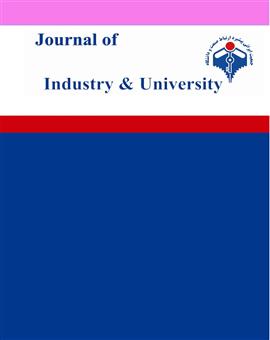Social responsibilities in scientific-educational organizations: how to redesign the business model
Subject Areas : Generalreza abbasi 1 , hosein sormeh 2
1 -
2 -
Keywords: Business model, social and environmental considerations,
Abstract :
The commitment of business owners to the design of the business model in away that ,in addition to providing its own benefits, improves the commuintys well- being and environmental sustainability, is at the forefront of customers attentino. The purpose of this study was to redesign the business model with an emphasis an social and environmental considerations at scientific and educational organizations. The present research is a practical purpose and the research organization of this research is the largest educational nongovernmental educational institution in Iran, which is active in the field of teaching and publishing study books and conucting program tests and academic planning. For this purpose and as a research sample, 1300 of the customer groups including students, students and funded scholars, blind and disabled students as well as groups of school builders, university dormitories and libraries were Selected and reviewed. Given the proposed values, the business model was presented in the social and environmental responsibility layers, so that in the new business model, the three proposed values in the field of social responsibility include social justice (educational), special services for particular classes and promotion Commonly accepted values of the community and two proposed environmental values, including the promotion of environmental protection and the use of green technologies.
1. فهرست، زهره، هادی تیموری، رضا انصاری (1396) تعیین رابطه بین مسئولیت¬پذیری اجتماعی سازمان و مزیت رقابتی (مورد مطالعه: گروه صنعتی انتخاب)؛ فصلنامه صنعت و دانشگاه، شماره 37، صص 44-35.
2. آزاد، علی، رحمتی. محمد، حسین، خنیفر، حسین (1396). طراحی مدل عوامل موثر بر مسئولیت¬ اجتماعی شرکت ملی نفت ایران، فصلنامه مدیریت سرمایه اجتماعی. دوره 4، شماره 2، صص 181-197.
3. بهرامی، اصلان (1395). آشنایی با حسابداری اجتماعی و ابعاد نوین مسئولیت اجتماعی، همایش مسئولیت اجتماعی شرکت- مسئولیت اجتماعی صنعت نفت، تهران، موسسه پژوهش در مدیریت و برنامه¬ریزی انرژی دانشگاه تهران.
4. زنجیرچی، محمد (1392)، مسئولیت¬های اجتماعی، شرکت بهره¬برداری نفت و گاز گچساران، همایش مسئولیت اجتماعی شرکت- مسئولیت اجتماعی صنعت نفت، تهران، موسسه پژوهش در مدیریت و برنامه¬ریزی انرژی دانشگاه تهران.
5. خلیلی عراقی، رضا (1384). بررسی ارتباط بین مسئولیت اجتماعی و سطح نگهداشت وجه نقد (شرکتی) در شرکتهای پذیرفته شده در بورس اوراق بهادار تهران، اولین همایش تحقیقات کاربردی در علوم اقتصاد، مدیریت و حسابداری، جیرفت، همایش گستران.
6. صلواتیان، سیاوش، تقوا، محمدرضا و میلاد گودرزی (1397)، طراحی بوم مدل کسب و کار رسانه¬های اجتماعی نوپای مردمی با جهت¬گیری راهبرد تمرکز پورتر، توسعه کارآفرینی دوره 11، شماره 1، صص 81-100.
7. طبرسا، غلامعلی (1390)، تبیین و طراحی مدل رسالت مسئولیت اجتماعی سازمان، مطالعات مدیریت راهبردی، شماره 8، صص 83-102.
8. کریمی، آصف و سوما رحمانی (1393). طراحی مدل کسب وکار برای چابکی سازمان؛ مطالعه موردی: شرکت خودروسازی سایپا، توسعه کارآفرینی، دوره 8، شماره 2، صص 273-292.
9. نصیری، روح¬اله (1394). مسئولیت اجتماعی و نقش آن در بهبود بهره¬وری و رقابت شرکت¬ها، همایش مسئولیت اجتماعی شرکت- مسئولیت اجتماعی صنعت نفت، تهران، موسسه پژوهش در مدیریت و برنامه¬ریزی انرژی دانشگاه تهران.
10. یگانه، علی (1396)، الزامات زیست محیطی در طراحی شناورهای تندرو، پنجمین همایش ملی شناورهای تندرو، تهران، انجمن علمی پژوهشی دریایی- دانشگاه صنعتی مالک اشتر.
11. Aluchna, M. (2010) Corporate social responsibility of the top; examples taken from the Warsaw Stock Excange. Social Responsibility Journal, 6 (4). 611-626.
12. Agpet, T(2001). "Codification of International Environmental Law and the International Law commission , Injurious Consequences Revisited", in International Law and Sustainable Development, Alan Boyle qnd David Freestone (eds), New York, Oxford University press
13. Byrne, B. M.(2015). Structural Equation Modeling with AMOS: Basic concepts, applications, & Francis Group.
14. Ccilia, W., & Wasserfaller, M. (2015). Internal organizational factors influencing voluntary CSR disclosure. School of Business Economics and Law, 23, 20-38.
15. Ehsan, H. Kallim, O (2017). Meeting of the OCED Council at Ministerial Level, Policies to Enhance Sustainable Development, Denver, OCED Publisher.
16. Lodari. OOCh. (2017). On the determinants of corporate social responsibility: international evidence on the financial industry. Corporate Govwemence: An International Review, 15, 119-216.
17. Lim, A. (2012). The global expansion of corporate social responsibility: Emergence, Diffusion, and reception of global corporate govermence frameworks. Doctoral Dissertation, Managment Dept. University of Michiga.
18. Ostervald, p. Mary, G. Theofilos, P. & Amalia, T. (2002). Managers perceptions and opinions towards corporate social responsibility (CSR) in Greece. Procardia Economis and Finance 1 International Conference on Applied Economis (ICOAE), 311-322.
19. Timers, S (1998). The Impact of Public Opinion on Environmental Policy; A Cross National Investigation, Ph. D. Dissertation, The Ohaio State University.
20. Vill, D. Wital, M (2001). “Comparative Analyses of Canadian and American Enviroment Policy; An Introduction to the Samposium”; Policy Studies Journal, 27, No. 2. Pp 23-43. 21. ISO. Org, ISO 14001: 2015.
22. Elkington, J,. 1994. Towards the sustainable corporation: Win- Win- Win business strstegies for sustainable development. Calif Manag. Rev. 36 (2), 90.


